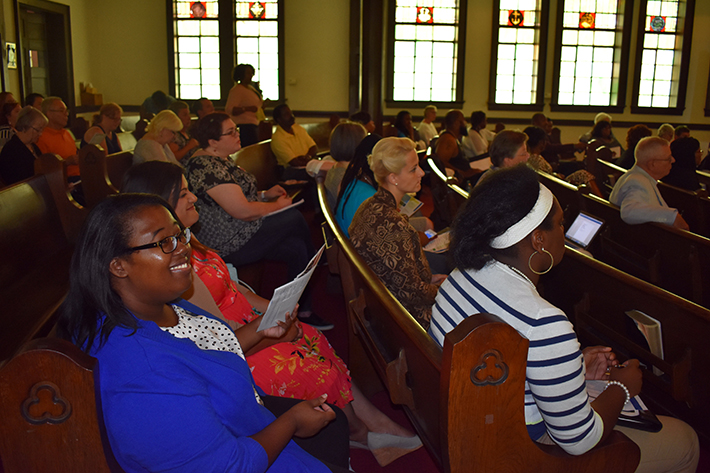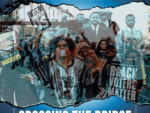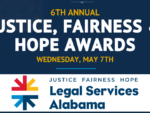By Desiree Taylor
More than 100 people from across the state gathered at the Historic Brown Chapel in Selma, Ala., July 8 to get informed about Alabama’s new law regarding voting rights.
Sponsored by the American Civil Liberties Union (ACLU) of Alabama and Legal Services Alabama, the Voting Rights Restoration Training attracted students, community leaders, dignitaries, state officials and lawyers who wanted to learn more about the crimes of moral turpitude statute and how it effects ex-offenders regarding the voting process. Signed by Gov. Kay Ivey in May, the new law will go into effect August 1. Speakers included the leadership and attorneys from ACLU and LSA, representatives from the Alabama Board of Pardons and Paroles and the Office of the Secretary of State, as well as the Rev. Kenneth Glasgow, a longtime voter restoration advocate.
Kynesha Brown of the Montgomery Alumnae Chapter of Delta Sigma Theta Sorority Inc., said the event was much needed for the area.
“With the current Moral Turpitude Law, many, including myself, were a little skeptical of the changes and how it would positively or negatively affect people with criminal convictions,” Brown said, whose group often holds voter rights restoration and expungement clinics. “Today’s training provided a much needed clarification regarding what convictions were removed, and the convictions that will still have to go through the Board of Pardons and Paroles process.”
Brown said her group is excited to partner with LSA and the ACLU to hold clinics in the Montgomery area beginning this fall.
Alice Dilbeck of Huntsville, who actively volunteers with civic organizations in Madison County, believed the event was very important.
“I was particularly impressed with the presence of high-level representatives from the Department of Pardons and Paroles, as well as from the Secretary of State’s office,” Dilbeck said. “I was also impressed at how much Mr. (Jonathan) Blocker (Legal Services Alabama) has already thought through the important aspects of staffing and logistics for the actual clinics.”
Dilbeck also stated, “It’s critical to ensure that the successes won in the recent bill are translated into enfranchisement and voting for previously incarcerated persons,” she said. “Without such clinics, I’m not sure that the word would get out to the population that most needs the information.”
For Dilbeck, attending the training provided more overall understanding of the crimes of moral turpitude legislation.
“Attending the full session and hearing the various speakers, made me more confident in my understanding of the law, and of the necessary steps to restoring voting rights,” Dilbeck said. “I will advise others that we should be diligent in helping people who have been denied registration, and will know that there are several avenues to take when it appears that such denial is unjustified.”
Ian Green, a third year law student at Cumberland School of Law in Birmingham, believed the event was timely and crucial. The training, Green said, helped to bring more clarity to what the new law means to ex-offenders and volunteers who wish to help them.
“The best part of the event was that everything was on time and that everyone’s questions were answered,” Green said. “With the procedural aspects (when it concerns ex-offenders regaining their voting rights) I felt really comfortable, and didn’t feel stuck or dissatisfied.”
Clinics will be held this summer throughout Birmingham, Mobile and the Black Belt. For more information regarding clinic dates and times, please visit www.legalservicesalabama.org event calendar.






